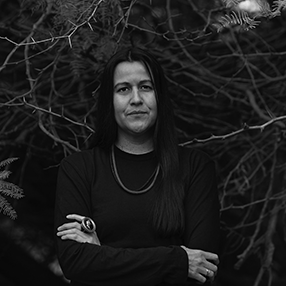lake-loop
, because there was yet no lake
into many nights we made the lake
a labor, and its necessary laborings
to find the basin not yet opened
in my body, yet my body—any body
wet or water from the start, to fill a clay
, start being what it ever means, a beginning—
the earth’s first hand on a vision-quest
wildering night’s skin fields, for touch
like a dark horse made of air
, turned downward in the dusk, opaquing
a hand resembles its ancestors—
the war, or the horse who war made
, what it means to be made
to be ruined before becoming—rift
glacial, ablation and breaking
lake-hip sloping, fluvial, then spilled—
I unzip the lake, walk into what I am—
the thermocline, and oxygen
, as is with kills, rivers, seas, the water
is of our own naming
I am wet we call it because it is
a happening, is happening now
imagined light is light’s imagination
a lake shape of it
, the obligatory body, its dark burning
reminding us back, memory as filter
desire as lagan, a hydrology—
The lake is alone, we say in Mojave
, every story happens because someone’s mouth,
a nature dependent—life, universe
Here at the lake, say
, she wanted what she said
to slip down into it
for which a good lake will rise—Lake
which once meant, sacrifice
which once meant, I am devoted
, Here I am, atmosphere
sensation, pressure
, the lake is beneath me, pleasure bounded
a slip space between touch and not
slip of paper, slip of hand
slip body turning toward slip trouble
, I am who slipped the moorings
I am so red with lack
to loop-knot
or leave the loop beyond the knot
we won’t say love because it is
a difference between vertex and vertices—
the number of surfaces we break
enough or many to make the lake
loosened from the rock
one body’s dearth is another body’s ache
lay it to the earth
, all great lakes are meant to take
sediment, leg, wrist, wrist, the ear
let down and wet with stars, dock lights
distant but wanted deep,
to be held in the well of the eye
woven like water, through itself, in
and inside, how to sate a depression
if not with darkness—if darkness is not
fingers brushing a body, shhhh
, she said, I don’t know what the world is
I slip for her, or anything
, like language, new each time
diffusion—remade and organized
and because nothing is enough, waves—
each an emotional museum of water
left light trembles a lake figure on loop
a night-loop
, every story is a story of water
before it is gold and alone
before it is black like a rat snake
I begin at the lake
, clean once, now drained
I am murk—I am not clean
everything has already happened
always the lake is just up ahead in the poem
, my mouth is the moon, I bring it down
lay it over the lake of her thighs
warm lamping ax
hewing water’s tender shell
slant slip, entering like light, surrounded
into another skin
where there was yet no lake
yet we made it, make it still
to drink and clean ourselves on
Copyright © 2020 by Natalie Diaz. This poem was co-commissioned by the Academy of American Poets and the New York Philharmonic as part of the Project 19 initiative and published in Poem-a-Day on March 28, 2020 by the Academy of American Poets.
“Part of the San Andreas fault runs along the Mojave Desert. We see and feel the fault, it has always been a part of Mojave stories and geography. We have always existed with it—in rift—part land. We are land’s action, maybe. I am always wondering and wandering around what it means to be part of this condition, in shift. What it means to embrace discontinuity, to need it and even to need to cause it in order to be—depression but also moving energy. The necessary fracturing of what is broken. The idea of being made anything or nothing in this country—’to be ruined before becoming’—the idea that this country tried to give us no space to exist, yet we made that space, and make it still—in stress, in friction, glide and flow, slip and heave. We are tectonic, and ready.
Natives weren’t granted citizenship until 1924—the 19th Amendment didn’t include them. Once granted ‘citizenship,’ many states still decided not to let Natives exercise their ‘right’ to vote—they often denied Black American ‘citizens’ this right. Utah refused to let Natives vote until 1962. As recently as 2018, North Dakota implemented a Voter ID Law that kept Natives with a P.O. Box number and no street address from voting, knowing that many reservations operate with P.O. Boxes. The 19th Amendment was important to many people, but it’s important to note who it was intended to advance, and to ask if those who were advanced have done enough or will do enough to advance all women, today, tomorrow.”
—Natalie Diaz

